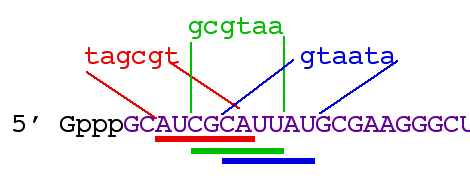
One of most frequently cited papers is one by Feinberg and Vogelstein (1983). Although Voglstein has dissected the molecular pathway to colo-rectal cancer and discovered many other fundamental biological processes, this technique paper ishas been cited by almost every molecular biologist at one point or another. The reason for its popularity is the simple solution to a vexing problem. How can you produce a complementary strand of DNA when you don't know the sequence or you want to produce many short DNA copies of every section of DNA in a complex mixture?
The solution is the random primer which is so simple that it left many people asking, "Now why didn't I think of that?". Random primers are short segments of single-stranded DNA (ssDNA) called oligonucleotides, or oligos for short. These oligos are only 6 nucleotides long (hexamers) and they consist of every possible combination of bases which means there must be 46= 4,096 different combinations in the mixture. Because every possible hexamer is present, these primers can bind to any section of RNA.

Figure 1. Three examples of hexamers from the mixture of all possible hexamers in random primers. These three particular primers could bind to three overlapping portions of this mRNA to prime the production of cDNA. The primer that arrives first will bind and the other two will have to find another segment of DNA (either another copy of the same mRNA or from a different locus) to bind. Hexamers were used instead of octamers to minimize clutter in the figure.
The only other point to consider is that their short length means that they do no bind to a segment of ssDNA with much force since there are very few hydrogen bonds holding the two strands together (template and oligo). Nevertheless, the method works amazingly well and is still in use to produce random pieces of DNA for probe production. These probes can be used on blots or DNA microarrays.
© Copyright 2002 Department of Biology, Davidson College, Davidson, NC 28036
Send comments, questions, and suggestions to: macampbell@davidson.edu